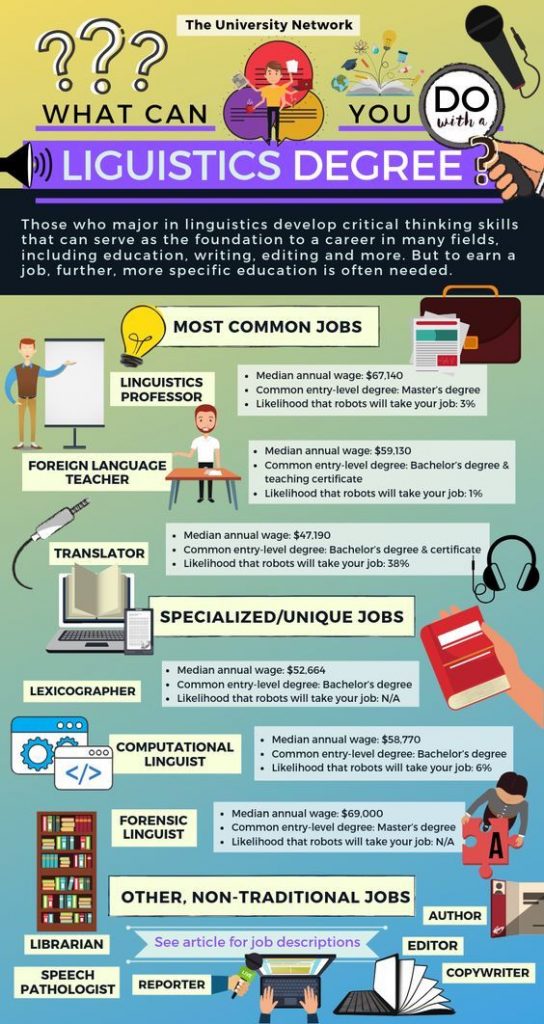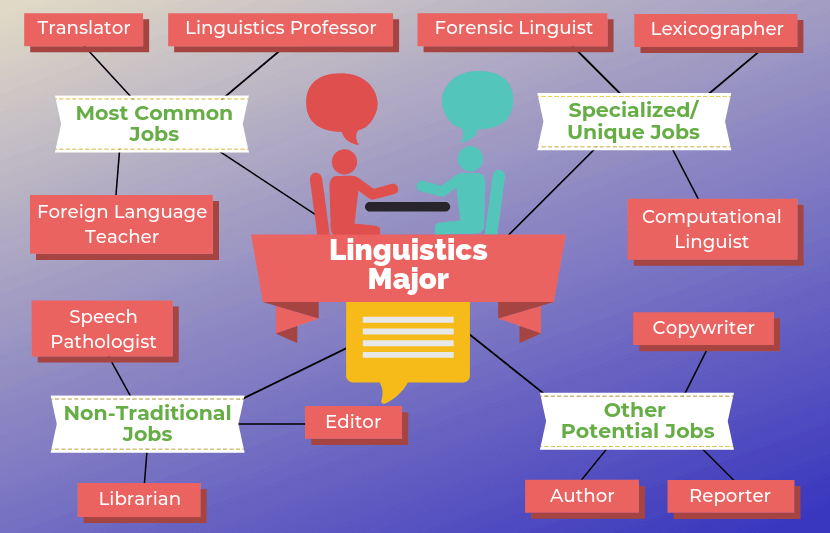Linguistics Jobs

Trained linguists are philosophers of language. They study the origins, developments, variances and nuances of languages used in countries across the world. Instead of focusing on noun memorization and verb conjugations, linguistics majors zero in on how culture shapes language. They study slang and sentence structure, among other things. Those who major in the subject develop critical thinking skills that can serve as the foundation to a career in many fields, including education, writing, editing and more. But to earn a job, further, more specific education is often needed.
Here is a list of 12 possible jobs for linguistics majors:
Most Common Jobs for Linguistics Majors
1. Linguistics Professor
Linguistics majors are often most comfortable in the university setting, where they can teach aspiring linguists and converse with their colleagues. But to be a good linguistics professor pursuing language teaching, linguistics majors should also have good communication and organization skills. To earn a job teaching at the post-secondary level, a master’s (and sometimes a doctorate degree) is required for linguistics professors. In addition to teaching, some college professors are required to conduct research and write scholarly articles.
Median annual wage: $67,140
Common entry-level degree: Master’s degree
Likelihood that robots will take your job: 3%
2. Foreign Language Teacher
While not all linguistics majors become multilingual, many do. And knowledge of a foreign language, paired with a general understanding of language structure, is a good recipe for foreign language teaching. However, after earning a bachelor’s degree, those who aspire towards foreign language teaching at the middle or high school level have to complete an internship in a school classroom, pass the state-required test for teachers and receive a teaching certificate/license.
Median annual wage: $59,130
Common entry-level degree: Bachelor’s degree & teaching certificate
Likelihood that robots will take your job: 1%
3. Translator
Even with the rise of technology, translators are still in high demand throughout the world. They are needed in government, courts of law, schools and more. Some translators work for private companies or individuals, and others work for large organizations, such as the United Nations, and government systems. Aspiring translators have to be entirely fluent in multiple languages, as they are often required to quickly and flawlessly translate important speech and/or text.
Median annual wage: $47,190
Common entry-level degree: Bachelor’s degree & certificate
Likelihood that robots will take your job: 38%

Specialized, Unique Jobs for Linguistics Majors
4. Lexicographer
Lexicographers are the people who put together dictionaries. They curate words that make it into the dictionary, and they create concise and accurate definitions for those words. Lexicographers hold tremendous power, as they determine the direction of different languages. Jobs in the field aren’t necessarily easy to come by, but for those who aspire to create dictionaries, a bachelor’s degree in linguistics can serve as a stepping stone.
Median annual wage: $52,664
Common entry-level degree: Bachelor’s degree
Likelihood that robots will take your job: N/A
5. Computational Linguist
Broadly, computational linguistics is a combination between linguistics and computer science. Those working in the field program computers to understand human language. Take Apple’s Siri or Amazon’s Alexa, for example. It is not an easy field, as computational linguists have to be experts in both human language and computer programing. However, with the rise of automation, there will likely be no shortage of job opportunities. In an effort to prepare people for a career in the field, many universities, including Stanford University and Indiana University, now offer computational linguistics as a major. But for those attending universities that don’t offer computational linguistics as an option, a dual major in linguistics and computer science is likely the best decision.
Median annual wage: $76,793
Common entry-level degree: Bachelor’s degree
Likelihood that robots will take your job: N/A
6. Forensic Linguist
Forensic linguists help detectives, FBI agents and others solve crimes by analyzing vocal and written evidence. Generally, they are employed by law enforcement agencies, private security firms and the federal government. After graduating with a bachelor’s linguistics degree, aspiring forensic linguists should pursue a master’s in the subject to increase their opportunity to earn a job.
Median annual wage: $69,000
Common entry-level degree: Master’s degree
Likelihood that robots will take your job: N/A
Non-Traditional Jobs for Linguistics Majors
7. Speech Pathologist
Speech pathologists, commonly known as speech therapists, evaluate, diagnose and help those with communication impairments. In addition to a bachelor’s degree in linguistics or language development, aspiring speech pathologists must earn their master’s in speech-language pathology and, in some states, earn a speech pathology license before they can earn a job.
Median annual wage: $76,000
Common entry-level degree: Master’s & license
Likelihood that robots will take your job: 0.6%
8. Editor
Linguistics majors develop a deep understanding of language, which makes them qualified candidates for editing positions. Nearly every magazine, newspaper, publishing house and content-producing website needs editors, so they are typically in high demand. And because there is public interest in various types of information, editors can work in all types of industries, including fashion, sports, politics, art, food and many more. Because editors often have the last look before writing is publicized, it is often a senior position. Companies like to hire editors who have prior experience either writing or editing.
Median annual wage: $58,770
Common entry-level degree: Bachelor’s degree
Likelihood that robots will take your job: 6%
9. Librarian
Due to their fascination with language and literature, some linguistics majors go on to become librarians. Broadly, librarians are often responsible for curating the books, online databases and additional educational materials that make up a library. They can work at various institutions, including schools, public libraries, museums, law firms, non-profit organizations and others. While it generally doesn’t matter what your undergraduate degree is in, many places won’t hire you as a librarian unless you have a master’s in library science.
Median annual wage: $58,520
Common entry-level degree: Master’s
Likelihood that robots will take your job: 65%
Other Potential Jobs for Linguistic Majors
10. Copywriter
Linguistics majors possess strong writing and grammar skills that can easily translate to a wide range of jobs, including copywriting. Copywriters are the professional writers who create the text for advertising materials, such as billboards, brochures and catalogs. Copywriters may work at an agency, in-house for a company, or freelance. There is no education requirement to become a freelance copywriter, but employment in an agency or at a company will typically require a bachelor’s degree.
Median annual wage: $62,720
Common entry-level degree: Bachelor’s degree
Likelihood that robots will take your job: 4%
11. Reporter
Technically, there is no required degree to become a reporter, but you will have a hard time finding a job without one. Skilled reporters are master storytellers with strong writing and grammar skills. To learn the essential skills, most aspiring reporters study journalism in college. However, linguistics majors often develop a deep understanding of language that translates well to journalism and reporting.
Median annual wage: $40,910
Common entry-level degree: Bachelor’s degree
Likelihood that robots will take your job: 11%
12. Author
Linguistics majors often have a vast vocabulary, which gives them the ability to paint a picture with their words. But like any art form, writing takes time, commitment and resilience. There is no golden guide to writing a best-selling book, but that shouldn’t discourage aspiring authors. Those who have the passion and skillset to write absolutely should.
Self-publishing has grown increasingly common in the internet age. But traditionally, to have a book published, authors seek out an agent who can connect them with publishing companies that can choose to print, publish and sell a book. Typically, the publishing company will work out some contractual agreement with the author to buy the rights to a book.
Median annual wage: Varies
Common entry-level degree: Varies
Likelihood that robots will take your job: 4%
Obtaining a linguistics degree offers numerous advantages for linguistics students and linguistics graduates, particularly as they pursue various linguistics careers in the language field. A linguistics degree equips linguistics students with a versatile skill set, including analytical thinking, problem-solving, and critical reasoning, which are applicable in various fields, from education (language teaching) to healthcare. Linguistics graduates can explore diverse career opportunities, such as becoming language professionals such as a speech and language therapist pursuing language therapy, language teaching (including ESL, foreign language education, and other language teaching fields), language acquisition research, and roles in language technology, particularly in natural language processing and artificial intelligence.
As globalization increases, the demand for effective communication across cultures becomes more pronounced, positioning linguistics graduates as vital in bridging communication gaps in international business, diplomacy, social services, language therapy, and more. Additionally, many students engage with issues of language and identity, empowering them to work in community language revitalization and advocacy for language rights, which adds a fulfilling dimension to their careers. The interdisciplinary nature of linguistics, intersecting with psychology, cognitive science, sociology, and anthropology, enhances graduates’ employability and broadens their perspectives through collaboration across fields.
Moreover, the emphasis on research within many linguistics programs allows students to develop skills in data collection and analysis, enabling them to contribute to cutting-edge research in areas like neurolinguistics, sociolinguistics, and psycholinguistics, which can lead to academic or professional opportunities. Studying linguistics also fosters critical cultural awareness, promoting empathy and effective communication in multicultural workplaces. As emerging fields such as language technology and communication design continue to grow, linguistics graduates find innovative career paths that leverage their understanding of language structures and usage. Overall, the advantages of obtaining a linguistics degree and pursuing linguistics careers in this field are substantial, providing graduates with the tools to tackle various professional challenges while making meaningful contributions to society.
10 Famous Linguists

- Noam Chomsky
- Eve Clark
- Umberto Eco
- Paul Grice
- Roman Jakobson
- Robin Lakoff
- Charles Pierce
- Steven Pinker
- Edward Sapir
- Ferdinand de Saussure
To explore options for other majors, click here.



